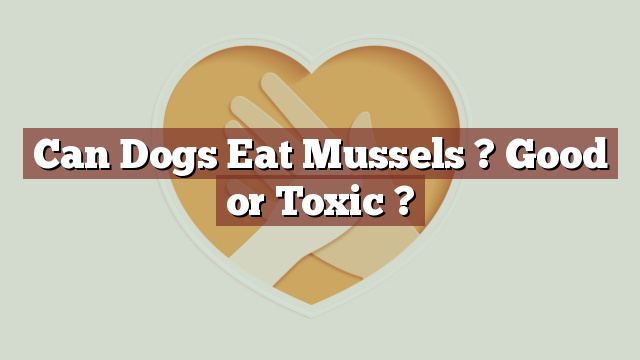Can Dogs Eat Mussels? Good or Toxic?
Ensuring the well-being of our beloved canine companions is of utmost importance. As responsible pet owners, it is crucial to have a good understanding of safe and nutritious foods for our furry friends. Mussels, a delicacy enjoyed by many humans, may leave some pet owners wondering if it is safe to share this tasty treat with their dogs. In this article, we will explore the nutritional value of mussels, discuss their safety for dogs, and provide guidance on feeding this seafood to our canine companions.
Nutritional Value of Mussels: A Rich Source of Essential Nutrients
Mussels are highly regarded for their nutritional value. They are a great source of protein, omega-3 fatty acids, iron, and various vitamins and minerals. Protein is vital for dogs as it supports muscle growth and repair. Omega-3 fatty acids contribute to healthy skin and a shiny coat, while iron plays a key role in maintaining healthy blood cells. Additionally, mussels contain significant amounts of vitamins B12 and C, as well as minerals such as manganese and selenium.
Can Dogs Eat Mussels? Understanding the Safety and Toxicity
Can dogs eat mussels? The answer is yes, dogs can safely consume mussels, provided certain precautions are taken. It is important to note that mussels must be cooked thoroughly before feeding them to your dog. Raw or undercooked mussels can harbor harmful bacteria and parasites, posing a risk to your pet’s health. Cooking the mussels properly will eliminate these potential hazards and ensure the safety of your furry friend.
Veterinarians also recommend removing the shells before offering mussels to dogs. The shells can be a choking hazard, and their sharp edges may cause injury to your dog’s digestive tract. By removing the shells, you can eliminate these risks and make the mussels easier to digest.
Potential Risks and Benefits of Feeding Mussels to Dogs
Feeding mussels to your dog in moderation can provide several health benefits. As mentioned earlier, mussels are an excellent source of protein and omega-3 fatty acids, which contribute to a healthy coat, skin, and overall well-being. The vitamins and minerals found in mussels, such as B12, C, manganese, and selenium, support various bodily functions and help maintain a strong immune system.
However, it is essential to exercise caution when feeding mussels to dogs with existing health conditions or allergies. Some dogs may have allergies to shellfish, including mussels. If your dog has a known shellfish allergy or experiences any adverse reactions after consuming mussels, such as vomiting, diarrhea, or difficulty breathing, it is important to seek veterinary advice promptly.
What to Do if Your Dog Eats Mussels: Immediate Actions and Monitoring
If your dog accidentally consumes mussels that were not prepared properly or exhibits any unusual symptoms afterward, it is crucial to take immediate action. Contact your veterinarian for guidance and monitor your dog closely for any signs of distress or discomfort. Prompt veterinary intervention can help address any potential issues and ensure your dog’s well-being.
Conclusion: Moderation and Veterinarian Consultation Ensure Safety
In conclusion, mussels can be a safe and nutritious addition to your dog’s diet when prepared and fed in moderation. Cooked mussels offer a source of protein, omega-3 fatty acids, and various vitamins and minerals that contribute to your dog’s overall health. However, it is vital to cook mussels thoroughly and remove the shells to eliminate potential hazards. If your dog has any underlying health conditions or allergies, it is advisable to consult with a veterinarian before introducing mussels or any new food into their diet. By being informed, taking precautions, and seeking professional advice when needed, we can ensure the safety and well-being of our beloved canine companions.
Thank you for investing your time in exploring [page_title] on Can-Eat.org. Our goal is to provide readers like you with thorough and reliable information about various dietary topics. Each article, including [page_title], stems from diligent research and a passion for understanding the nuances of our food choices. We believe that knowledge is a vital step towards making informed and healthy decisions. However, while "[page_title]" sheds light on its specific topic, it's crucial to remember that everyone's body reacts differently to foods and dietary changes. What might be beneficial for one person could have different effects on another. Before you consider integrating suggestions or insights from "[page_title]" into your diet, it's always wise to consult with a nutritionist or healthcare professional. Their specialized knowledge ensures that you're making choices best suited to your individual health needs. As you navigate [page_title], be mindful of potential allergies, intolerances, or unique dietary requirements you may have. No singular article can capture the vast diversity of human health, and individualized guidance is invaluable. The content provided in [page_title] serves as a general guide. It is not, by any means, a substitute for personalized medical or nutritional advice. Your health should always be the top priority, and professional guidance is the best path forward. In your journey towards a balanced and nutritious lifestyle, we hope that [page_title] serves as a helpful stepping stone. Remember, informed decisions lead to healthier outcomes. Thank you for trusting Can-Eat.org. Continue exploring, learning, and prioritizing your health. Cheers to a well-informed and healthier future!

